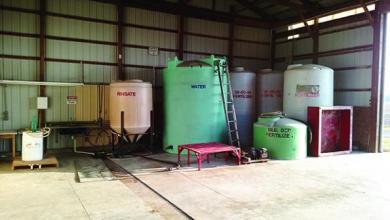Explore our blog featuring articles about farming and irrigation tips and tricks!
To Get Best Herbicide Performance, Lukewarm Water Can Help

By: Keith Robinson
Guidance offered in Water Temperature and Herbicide Performance is based on research by Purdue University weed scientists who studied the effectiveness of certain herbicides on several weed species when mixed with spray water at various temperatures. The researchers concluded that moderate to warm water — but not hot — was better than cold.
“We give the guidelines of not using cold water in the early spring or late fall,” said Pratap Devkota, the lead researcher and graduate research assistant to weed scientist Bill Johnson. “Make sure you use moderate to warm water. The right water temperature is one of the components of herbicide application.”
Farmers generally are not aware of that, Devkota said, because there has been little research on the topic.
In a greenhouse study, herbicide was applied to weed species giant ragweed, marestail (horseweed), Palmer amaranth and pitted morningglory. Herbicides used were 2,4-D choline, glufosinate, mesotrione and glyphosate plus dicamba pre-mix. Each herbicide solution was held for 24 hours and six hours before application. It also was applied immediately after mixing.
The researchers found that performance was reduced on some weed species when the herbicides were mixed with water at 41 degrees Fahrenheit, the lowest temperature tested. They also discovered that performance was reduced at 133 degrees, the highest temperature tested. Performance was not reduced at 72 and 102 degrees, the middle temperatures tested.
The study found that the herbicide mixtures held for up to 24 hours did not affect weed control in any of the tested herbicide products.
The researchers cautioned, however, not to generalize the results for all herbicides. They noted previous research showing that some herbicide products from Group 2 (ALS inhibitors) can undergo hydrolysis when spray solutions remain in a tank for a certain period; likewise, herbicides in Group 1 (ACCase inhibitors) can break down when ultraviolet radiation infiltrates a tank.
Stay up to date on all T-L news and get alerts on special pricing!


